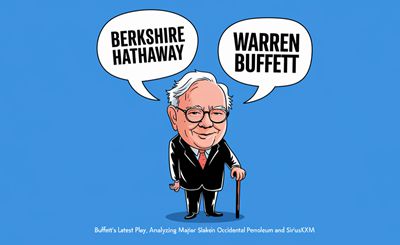Expedia Shares Jump on Uber Takeover Speculation: Investor Implications
The Buzz Behind the Surge
On October 17, 2024, Expedia’s stock price reached a two-year high, trading at approximately $158.41 per share, marking a significant 7.7% increase during the morning session. This surge was largely driven by reports of Uber’s interest in acquiring Expedia, a move that aligns with Uber’s ambition to evolve into a “super app.” The idea of a super app is to integrate multiple services into a single platform, offering users a seamless experience across various needs, from ride-hailing to travel booking.
Why Uber is Interested
Uber’s interest in Expedia is not entirely unexpected. The ride-hailing giant has been on a growth trajectory, driven by a resurgence in demand for its core services and a strategic focus on expanding its offerings. By acquiring Expedia, Uber could diversify its business beyond ride-hailing and food delivery, tapping into the lucrative travel market. This move would also leverage the expertise of Uber’s CEO, Dara Khosrowshahi, who previously led Expedia and remains a non-executive board member.
Market Reaction
The market’s reaction to the news was swift and significant. Expedia’s stock rose by as much as 7%, while Uber’s stock experienced a slight decline of up to 3%. This mixed response reflects investor sentiment about the potential benefits and risks associated with such a large-scale acquisition. For Expedia, the news of a potential takeover has been a boon, boosting its market value to over $20 billion. For Uber, the decline in stock price suggests some investor caution about the financial and operational challenges of integrating a major acquisition.
Strategic Implications for Uber
Diversification and Market Expansion
Acquiring Expedia would allow Uber to diversify its offerings and expand its market presence. Expedia’s extensive portfolio, which includes travel-booking websites like Expedia.com, Hotels.com, and Vrbo, would provide Uber with a robust platform to enter the travel booking space. This diversification aligns with Uber’s strategy to become a comprehensive service provider, akin to Chinese super-apps like WeChat.
Leveraging Technology and Expertise
Integrating Expedia’s booking technology could enhance Uber’s service efficiency and user experience. This technological synergy would not only streamline operations but also offer users a more versatile platform. Moreover, Khosrowshahi’s deep-rooted connection to Expedia could facilitate a smoother integration and strategic alignment, potentially making the acquisition process more seamless.
Challenges and Considerations
Despite the potential benefits, the acquisition poses several challenges. Integrating two large companies with distinct operational models could be complex, requiring careful management of backend synergies and consumer operations. Additionally, the travel industry is highly competitive, with major players like Booking.com, Airbnb, and Google posing significant challenges.
What This Means for Expedia
Boost in Market Value
For Expedia, the news of a potential acquisition has been a catalyst for a significant boost in market value. The company’s stock has risen substantially, reflecting investor optimism about the potential for a lucrative buyout. This increase in market value positions Expedia favorably in the eyes of investors, who may see the acquisition as an opportunity for enhanced growth and profitability.
Strategic Opportunities
Being part of Uber’s super app vision could open new strategic opportunities for Expedia. The integration could lead to innovative service offerings, combining travel booking with Uber’s ride-hailing and delivery services. This synergy could enhance customer experience and drive growth in both companies’ user bases.
Analyst Perspectives
Mixed Ratings and Cautious Optimism
Analysts have expressed mixed opinions about the potential acquisition. While some see it as a “major strategic home run” for Uber, others remain cautious due to uncertainties surrounding the travel industry’s recovery from the pandemic. The consensus rating among Wall Street analysts for Expedia is “Hold,” with a predicted downside in stock price. However, the potential acquisition has injected a sense of cautious optimism into the market, with some analysts revising their price targets upward.
Potential Impact on Uber’s Valuation
Analysts suggest that the acquisition could significantly impact Uber’s valuation. Without the deal, Uber’s fair value is estimated at $103 per share, but with the acquisition, it could rise to $130. This potential increase reflects the strategic value that Expedia could bring to Uber’s business model, enhancing its growth prospects and market share.
The Bigger Picture: Implications for the Industry
Transforming the Travel and Tech Landscape
If the acquisition goes through, it could have far-reaching implications for the travel and tech industries. By integrating ride-hailing services with travel booking, Uber could streamline the user experience and increase market competition. This move could also set a precedent for other tech giants to explore similar integrations, potentially transforming the landscape of travel and technology.
Regulatory and Competitive Challenges
However, the acquisition would not be without its challenges. Regulatory scrutiny could pose significant hurdles, as authorities may closely examine the implications of such a large-scale merger. Additionally, the competitive landscape in both the travel and tech sectors is fierce, with established players likely to respond strategically to maintain their market positions.
Conclusion: What Should Investors Do?
For individual investors, the news of Uber’s potential acquisition of Expedia presents both opportunities and risks. On one hand, the acquisition could unlock significant value for both companies, driving growth and enhancing market presence. On the other hand, the complexities of integrating two large companies and the competitive challenges in the industry warrant cautious optimism.
Actionable Insights
- Monitor Developments: Investors should closely monitor developments related to the acquisition, paying attention to any official announcements or changes in market sentiment.
- Evaluate Risk Tolerance: Consider your risk tolerance and investment goals when deciding whether to invest in either company. The potential for growth must be weighed against the inherent risks of such a large-scale acquisition.
- Diversify Your Portfolio: As always, diversification remains a key strategy for managing risk. Consider balancing your portfolio with investments in other sectors to mitigate potential volatility.
In conclusion, while the potential acquisition of Expedia by Uber is still in the early stages, it represents a bold strategic move that could reshape the future of both companies and the industries they operate in. As the situation unfolds, investors should stay informed and consider the broader implications for their investment strategies.


